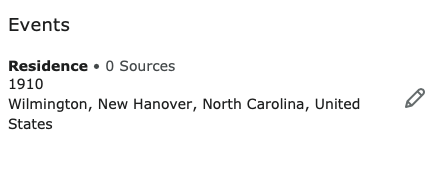Standardized information: better transparency, fewer clicks
Comments
-
It will tell you there if it's NOT standardised. For instance this means it's NOT standardised:
If it doesn't say "Non-Standardised", then it is Standardised. Too many people were hacking the Display values to match the Standardised values - this is not needed and was destroying things like addresses that were legitimately and correctly added on the front of the standard place-names.
So you don't need to do any extra click. You just need to remember that the message is different.
9 -
The map pin icon in the old product only showed if the text matched the selected standard text exactly for the language you were using.
Examples:
1) If you put in a full street address for the place and standardize it to the city the pin wouldn't show, but it would be standardized.
2) If you got the map pin to show in English and then switched to Spanish it wouldn't show.
It made for inconsistent behavior and encouraged users to update place names that didn't need to be updated.
4 -
The issue is the bad release.
It is not as good as the previous.
when are you reverting.
3 -
93% of users have been using the new person page for months. We just turned off the old page. I doubt there will be any reverting.
4 -
I would say the last 7% did the majority of work.
This is painful to work in this version.
I have not gotten much done since the forced conversion.
0 -
But be careful about being drawn into a false sense of security when a placename is standardized!
This placename is meant to represent "Norwich, Norfolk, England, United Kingdom" - but see (in the second screenshot) what "Norwich" has been standardized to:
In order to produce the screenshot below I did click on "Edit", but hovering over the displayed placename (on the Details page) provides the same information - telling me the placename has not been standardized to what I expected!
4 -
@Paul W was Norwich, Norfolk, England, United Kingdom not an option when entering Norwich? If one does select the wrong place - then yes it could be confusing. One might need to type in the parent place - Norfolk or England - to get the correct option to display.
0 -
I confess this was a deliberate mock-up (for illustrative purposes)! However, it is something I have often encountered. It usually happens due to another user's carelessness in selecting the wrong "standard", but can happen when carrying over a source which includes a wrongly standardized placename.
What does it matter? Mainly in "confusing the search algorithm" into believing you are (in this example) seeking a record relating to South Africa and not England!
4 -
93% of users have been using the new person page for months.
Where did that metric come from? Is that sheer number of users regardless of time spent, or does that just count anybody who visited the site?
was Norwich, Norfolk, England, United Kingdom not an option when entering Norwich?
It might have been when whoever created the profile or added the location from a source made the edit, or maybe the more specific location didn't exist in the standardized database at the time the location was added. The question assumes the person editing now was the person who made the initial entry, which is very rarely the case. In the work I've done, it's much more common that a source refers to a specific church or parish, but the system only standardizes it to a much more broad level like city, state or country, even if the more precise location actually does exist in the database with slightly different wording.
1 -
It's as though it was designed to be as unintuitive as possible and really slow people down, so you can't get into a groove, so to say. Of course I'm not literally saying that was the intent, but it does seem to have that unfortunate effect.
2 -
It's as though it was designed to be as unintuitive as possible and really slow people down, so you can't get into a groove, so to say. Of course I'm not literally saying that was the intent, but it does seem to have that unfortunate effect.
If that is the effect I welcome it. There are too many reports here in Community of people contributing bad data to profiles - is slowing them (or myself) down a bad thing? Does affecting the "[getting] into a groove" which may have been process/muscle memory of the previous version - mean that a new process/groove cannot be learned? The new pages are so similar that I cannot recall being impeded more in this newer version. The same options to add data - plus new features - are available - data is data... People proficient in the previous version should definitely not find difficulty once familiarizing themself?
Some people are complaining about Standardization of Place and Dates not being visible. Is this the area people feel is impeding them? FamilySearch will indicate if a place/date is not standardized by red lettered text - if there isn't red lettered text below a place/date then no further standardization is needed. Perhaps/hopefully this 'slowing down' could help people reflect/verify places and dates (or other data) more accurately.
I for one - would welcome a process by which places that were unstandardized - could determine whether they then need to be added into the places database - but that would slow the process even further - and people would need to learn that process ... but once that process is learned it would/hopefully greatly contribute to places being added accurately into places database (I'd rather see good place data added to the database than to inaccurately remove good data in a misguided effort to 'standardize').
If there are other areas users feel impeded - perhaps these could be discussed/explained. Trading off speed for accuracy is an important balance - I would vote for impedance to result in better accuracy rather than removing it to allow speed entry. Bad data in Tree is good for no one - garbage in garbage out...
5





